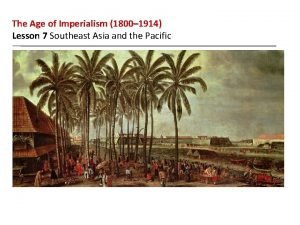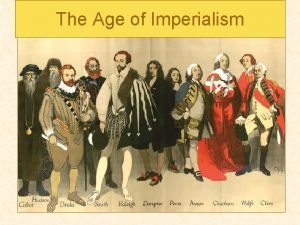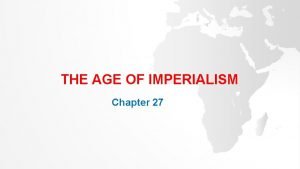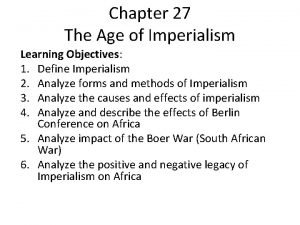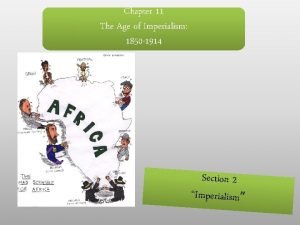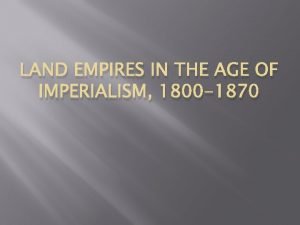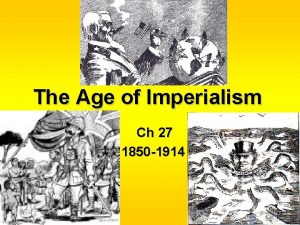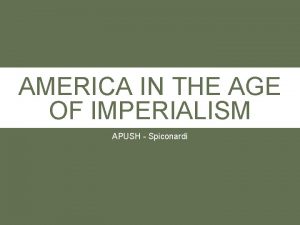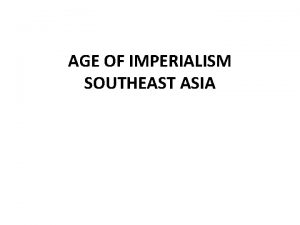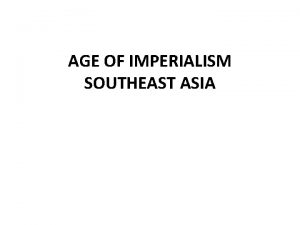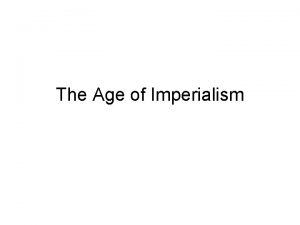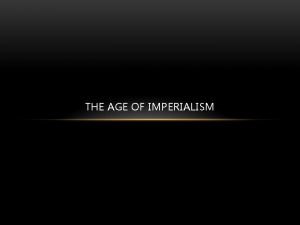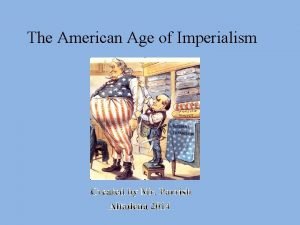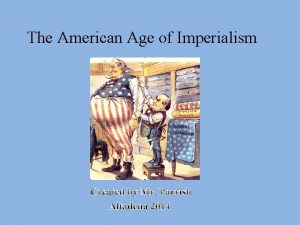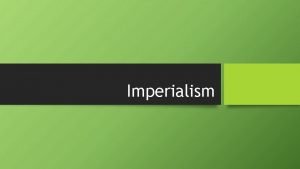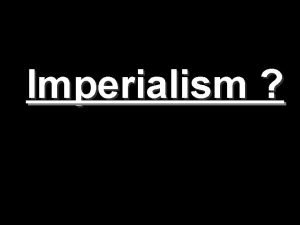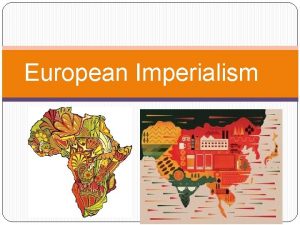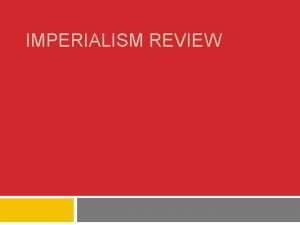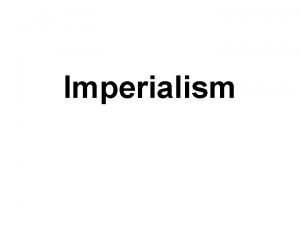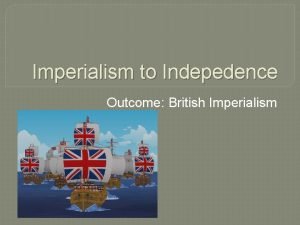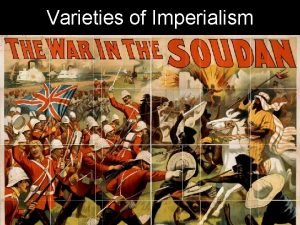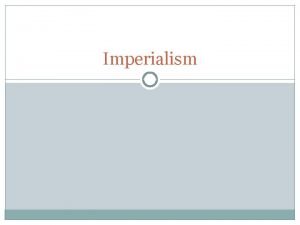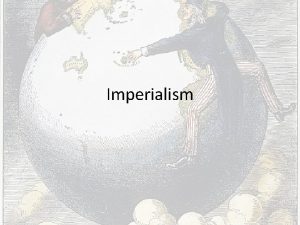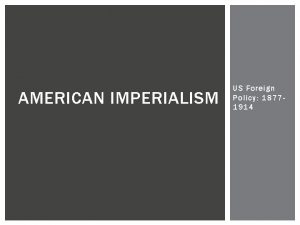Age of Imperialism Unit Four The Age of





























- Slides: 29

Age of Imperialism Unit Four

The Age of Imperialism Industrialization stirred ambitions in many European nations. They wanted more resources to use towards their industrial production and they competed for new markets for their goods. European nations looked to Africa and Asia as sources of the raw materials and as markets for cloth, plows, guns, and other industrial products. In our fourth unit, as we explore the Age of Imperialism, we will do so in four sections: 1. Imperialists Divide Africa 2. Muslim Lands Fall to Imperialist Demands 3. British Imperialism in India 4. Western Powers Rule Southeast Asia

What is Imperialism? IMPERIALISM: takeover of a country or territory by a stronger nation with the intent of dominating the political, economic and social life of people within that nation v Europeans were motivated by political, economic and social forces Economic Motives External Forces Nationalism Maxim gun Economic competition Railroads & steamships European racism Cure for malaria Missionary impulse

What is Imperialism? v Because of advanced technology, Europeans believed they were better than other people RACISM: the idea that one race is superior to others SOCIAL DARWINISM: social theory asserting that those fittest for survival enjoyed wealth and success and were superior to others, “survival of the fittest”


Imperialists Divide Africa Section One

Pre-Imperialism in Africa Prior to the Age of Imperialism, Europeans controlled very little of the land on the large continent of Africa. As late as 1880, Europeans controlled only 10 percent of the continent’s land, mainly on the coast. Two factors kept Europeans mostly out of Africa: 1. Europeans could not travel into the interior of Africa due to the African rivers 2. Large networks of Africans conducted trade, keeping Europeans from controlling the sources of trade

Enabling Forces v External and internal forces contributed to the Europeans’ conquest of Africa v First automatic machine gun, The Maxim, gave Europeans an advantage v European countries had means to control their empire v Quinine (a drug) allowed Europeans to avoid malaria v Africans’ huge variety of languages and cultures discouraged unity among them, allowing Europeans to play rival groups against each other

Berlin Conference v 14 European nations met in 1884 -1885 to lay down rules for division of Africa v Divided continent with no thought of how African groups were distributed v No African rulers attended the meetings

Effects of the Berlin Conference v Businesses developed cash crops plantations to grow peanuts, palm oil, cocoa and rubber v Products displaced food crops grown to feed families v Major source of wealth continued to be rich mineral resources

Three Groups Clash AFRICANS: although lands seemed empty to the Europeans, huge areas had been claimed by ethnic groups – among them the Zulu people DUTCH: Dutch settlers, known as Boers, gradually took over native Africans’ lands and established large farms; later clashed with the British BRITISH: took over Cape Colony in the 1800 s and fought with the Boers

Boer War: 1899 -1902 v Diamond and gold were discovered in the 1860 s and 1870 s v Boers tried to keep others from gaining rights v An attempt to start a rebellion failed and Boers blamed the British v First modern “total” war v Britain won in 1902

Muslim Lands Fall to Imperialist Demands Section Two

The European powers who carved up Africa among themselves also looked elsewhere to see what other lands they could control. The Muslim lands that rimmed the Mediterranean had largely been claimed as a result of Arab and Ottoman conquests. Now the Muslim power in those areas weakening. Europeans competed with each other to gain control of this strategically important area. A series of weak rulers destroyed the political unity of the Empire. With this weakening, the economy began to collapse – currency was devalued, unemployment rose, and the different nationalities began to fight both their Turkish masters and each other.

Desire for Independence Different groups began to want independence. These groups included: v Greeks v Kurds v Serbians v Armenians v Bosnians v Syrians v Romanians

Europeans Grab Territory GEOPOLITICS: interest in or taking of land for its strategic location or products v World powers were attracted to the strategic location of the Ottoman Empire CRIMEAN WAR: war between Russians and Ottomans over land on the Black Sea; Ottomans supported by British and French won the war v Despite winning the Crimean War, the Ottoman Empire continued to lose land

In the Muslim lands, the European imperialists gained control by using economic imperialism and creating spheres of influence. Although some governments made attempts at modernization, in most cases it was too little too late. In other areas of the globe, imperialists provided the modernization. India, for example, became a colony that experienced massive change as a result of the occupation of the imperialist British.

British Imperialism in India Section Three

British Expand Control British economic interest in India began in the 1600 s , when the British East India Company set up trading posts in Bombay, Madras and Calcutta. At first, India’s ruling Mughal Dynasty kept European traders under control. By 1707, the Mughal Empire was collapsing. Dozens of small states, each headed by a separate ruler, broke away from Mughal control. The East India Company quickly took advantage of the growing weakness of the Mughals. In 1757, Robert Clive led company troops in a decisive victory over Indian forces at the Battle of Plassey. From then on, the East India Company was the leading power in India. The area controlled by the company grew over time. Eventually, it governed directly or indirectly an area that included modern Bangladesh, most of southern India, and nearly all territory along the Ganges River in the north.

British Expand Control East India Company Dominates • British East India Company rules India until 1850 s • Company has its own army led by British officers • Army is staffed by sepoys SEPOYS: Indian soldiers Britain’s “Jewel in the Crown” • India is Britain’s most valuable colony • Forced to produce raw materials for British manufacturing and buy British goods

Jewel of the British Crown v Population = 300 million making India a large market for the British v India was a major supplier of raw materials: tea, indigo, cotton, coffee, and opium The British imposed restrictions on the Indians: 1. Indians produce raw materials 2. Indians must buy British goods 3. Indian manufacturers were not allowed to compete with British factories, crushing the Indian textile business

Impact of British Imperialism in India Negatives v. Britain restricted Indian ownership of industries v. Place emphasis on cash crops v. Missionaries v. Racism Positives v. Railroads v. Modern network of roads v. Telephone and telegraph lines v. Dams, bridges and irrigation canals v. Schools and colleges

Sepoy Rebellion 1857: Sepoys revolt as a result of years of mistreatment: 1. 2. 3. v Hindus and Muslims forced to use rifle cartridges greased with animal fat Traditional class and religious differences are ignored by British Force Sepoys to fight and defend their colonies abroad Great Britain crushes rebellion and takes DIRECT CONTROL over India RAJ: British rule over India until 1947

Calls for Reform v Ram Mohun Roy leads modernization movement v Many Indians adopt western ways and call for social reforms v Nationalist groups seek independence – the Indian National Congress (1885) and the Muslim League (1906)

Western Powers Rule Southeast Asia Section Four

v Europeans Race to Claim Pacific Rim Dutch, British, French, Germans and Americans v Raw materials: sugar cane, coffee, cocoa, rubber, coconuts, bananas, pineapple

Dutch Expand Control v Controlled the island chain known as Indonesia v Wanted the oil and tin that were discovered there along with other natural resources Dutch saw this area as there new home and thus created a rigid caste system: 1. Dutch 2. Wealthy & Educated Indonesians 3. Plantation workers

French in Indochina v Control Vietnam, Laos and Cambodia v Used direct control v Exported rice at the cost of the Vietnamese

Colonial Impact v Modernization mainly helps European business at the cost of the colony v Education, health, and sanitation improve v Millions migrate to southeast Asia to work in mines and on plantations v Colonialism leads to racial and religious problems
 Contrast siam's fate to that of burma and vietnam
Contrast siam's fate to that of burma and vietnam Motives of old imperialism
Motives of old imperialism Old imperialism vs new imperialism chart
Old imperialism vs new imperialism chart Stone age chronology
Stone age chronology Iron age bronze age stone age timeline
Iron age bronze age stone age timeline Age of imperialism
Age of imperialism Chapter 27 building vocabulary the age of imperialism
Chapter 27 building vocabulary the age of imperialism Chapter 27 building vocabulary the age of imperialism
Chapter 27 building vocabulary the age of imperialism Chapter 11 the age of imperialism
Chapter 11 the age of imperialism Land empires in the age of imperialism
Land empires in the age of imperialism Chapter 27 the age of imperialism
Chapter 27 the age of imperialism Seward's icebox apush
Seward's icebox apush Unit 6 review questions
Unit 6 review questions Hát kết hợp bộ gõ cơ thể
Hát kết hợp bộ gõ cơ thể Ng-html
Ng-html Bổ thể
Bổ thể Tỉ lệ cơ thể trẻ em
Tỉ lệ cơ thể trẻ em Chó sói
Chó sói Thang điểm glasgow
Thang điểm glasgow Hát lên người ơi
Hát lên người ơi Môn thể thao bắt đầu bằng từ đua
Môn thể thao bắt đầu bằng từ đua Thế nào là hệ số cao nhất
Thế nào là hệ số cao nhất Các châu lục và đại dương trên thế giới
Các châu lục và đại dương trên thế giới Công của trọng lực
Công của trọng lực Trời xanh đây là của chúng ta thể thơ
Trời xanh đây là của chúng ta thể thơ Mật thư tọa độ 5x5
Mật thư tọa độ 5x5 101012 bằng
101012 bằng Phản ứng thế ankan
Phản ứng thế ankan Các châu lục và đại dương trên thế giới
Các châu lục và đại dương trên thế giới Thơ thất ngôn tứ tuyệt đường luật
Thơ thất ngôn tứ tuyệt đường luật
